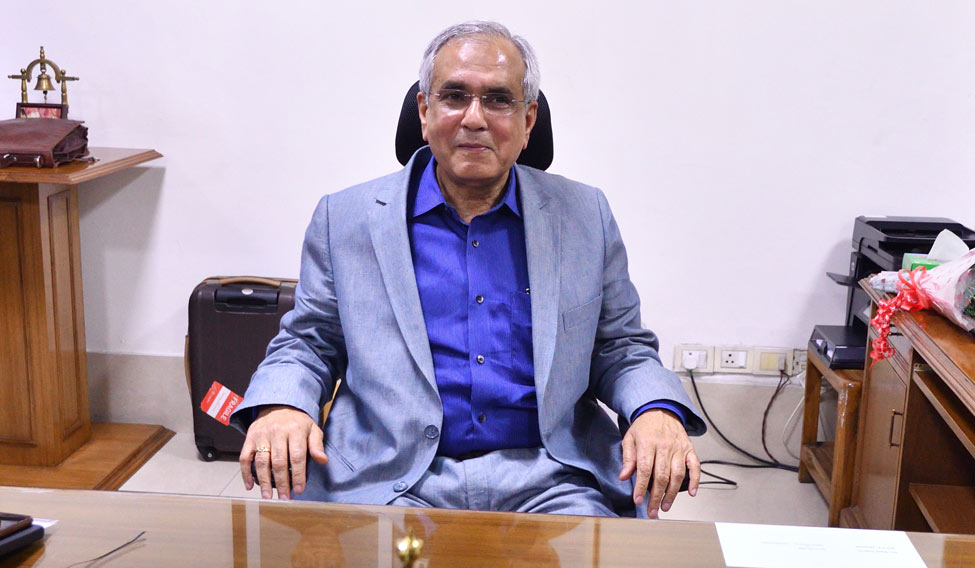Dr Rajiv Kumar, who took charge as the new vice chairman of the NITI Aayog on Friday, was not at all worried about the GDP figures released on Thursday, and said it was only a blip. He quoted an old Hindi saying "Challang lagaane se pehle do teen kadam peeche jana padta hai (Before you take the leap forward, you have to take two or three steps back)."
According to him, there were pointers to a growth of 7 to 7.5 per cent growth in the July-August-September quarter. Good monsoons, increased inflow into FDI and FII, the smooth roll out and clarity on GST and also the increased domestic investments indicated by the long line of IPOs lined up, indicate the confidence in the capital markets growth in services sector.
During his first interaction with the media in his new capacity, Kumar, who has straddled private sector, public sector and academia, said it (VC of NITI Aayog) was "a dream job for an economist", and recalled days spent in the Yojana Bhavan library to research for his PhD. He invoked Prime Minister Narendra Modi more than once, and said the prime minister must have thought it out well to name this institution "NITI—National Institution for the Transformation of India".
"So this business as usual is not going to work. New and out of the box ideas will help to transform the economy by 100 years of freedom," he said adding that ideas will come in from everywhere. Dr Kumar described it as the real Private Public Partnership. "This will ensure that policy making is not an elitist activity, and development is a mass movement, and the development model is homegrown, Indian," he said.
Kumar said the idea was to increase governance capacity at the state-level, making for competitive and cooperative federalism. It had to be done by the NITI Aayog because the ministries were busy, and so that the states are on the same page as the Centre.
Kumar was confident that the economy would grow “at least 7 to 7.5 per cent” in the second quarter. “This quarter GDP figure is not permanent. It is only a blip,” he said. He attributed the fall in GDP for the June quarter, among a few other things, to the destocking that led to sales and discounts ahead of the roll out of GST, which he reasoned had resulted in a production slow down.
The figure in the previous quarter was 6.1 per cent and the current data, which indicated the slowest growth in the last three years, had worried even Finance Minister Arun Jaitely into admitting it was a matter of concern. "It throws up a challenge for the economy. In the coming quarters we have to work to improve upon this figure,” he told the media.
Calling the GDP figure released on Thursday merely a statiscal fact, Kumar quoted the Chief Statistical Officer of India, T.C.A. Ananth as saying there was a "deflator effect" on the part of the Wholesale Price Index, which was negative earlier, but had now become positive.
Kumar gave the suspect demonetisation a clean chit, saying that the impact—he did not use the word adverse—of demonetisation had begun in January and lasted only for six weeks. "Therefore it is wrong to say that the April-May-June GDP fall is on account of the demonetisation".
Talking about the successive drop in GDP over the last few quarters, Kumar said, historically when countries take on fundamental reforms, such a drop was bound to happen. "There is lot of work in progress, and this quarter is only a blip," he said.
The new vice-chairman of the NITI Aayog confessed "the critical task of job creation" had to be addressed. While his predecessor Dr Arvind Panagariya had referred to the job situation as “underemployment” rather than unemployment, Kumar said there was no debate on underemployment or unemplyment, but the fact was that demand for jobs and aspirations had gone risen. He randomly identified sectors like tourism, textiles, handicrafts and agro processing as sectors that could generate employment.
Stating that the macro fiscal effect of loan waiver had brough many states to a precarious level, Kumar said the NITI Aayog would engage with them as farmers distress was "a very real, and not imaginary issue”.
NITI member Ramesh Chand pointed out that there were more effective ways of adding to agricultural productivity than loan waivers, which benefit very few farmers.
To a question regarding NITI Aayog recommending privatisation and disinvestments, giving the impression it had put India on sale, Aayog CEO Amitabh Kant said they had committees that gave proposals to deal with sick and loss making PSUs, as well as disinvestment. While the Aayog only made recommendations, the ministries processed them and the cabinet took the call, he said, asserting that NITI was only an advisory body.
Kumar had, as a member of the committee that went into the details of a successor for the Planning Commission, preferred statutory role for it. But now, he said, he was convinced that they would be able to contribute intellectual heft this way, while statutory role would have made it a “complacent” .
Talking of business and corporate houses in the context of growth and development, Kumar said the days of “us and them” had gone.





